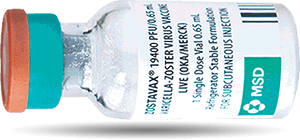The Centers for Disease Control and Prevention (CDC) reports that almost one in three people in the U.S. will develop shingles during their lifetime. This is a painful condition that starts in the nerves and typically erupts on the skin in a blistering rash. Though some people will only suffer from it once, other can experience recurring flare-ups.
In 2006, American pharmaceutical company Merck & Co. received FDA approval for Zostavax, a shingles vaccine. A live, viral vaccine, it was approved to prevent shingles (also called herpes zoster) in adults 60 years and older. That approval was later extended in 2011 to include adults aged 50 to 59, based on evidence from a clinical trial that the vaccine reduced risk of developing shingles by nearly 70 percent in this age group.
Not everyone who has received the Zostavax vaccine has fared well. A number of individuals have filed Zostavax lawsuits against Merck, claiming the company failed to provide adequate warnings about the vaccine’s serious risks. The plaintiffs allege that Zostavax caused serious side effects, including shingles—the very disease it was meant to prevent.
What is Shingles?
Shingles is a painful rash caused by the varicella-zoster virus, which also causes chickenpox. Anyone who’s had chickenpox can develop shingles when they get older. Even after an individual heals from chickenpox, the virus lies dormant in the nerve cells until it is woken it up.
Risk factors for shingles include age, illnesses that weaken the immune system (like HIV/AIDS and cancer), radiation or chemotherapy treatments, and drugs designed to weaken the immune system, like those used following an organ transplant.
The disease can be very difficult for a patient to deal with because of the pain, which can be excruciating. In fact, this is often the first symptom a person will notice. Then usually (but not always), the rash will develop on the skin. It’s red and mean, and can cause fluid-filled blisters that break open and crust over. Often the rash develops around one side of the torso, but it may also affect the eyes, neck, or face. Other potential symptoms include fatigue, fever, headache, and numbness/tingling.
In most cases, the rash and any other accompanying symptoms eventually go away. But in rare cases, the nerve pain continues. Individuals may also develop facial paralysis or vision problems, if the rashes occurs around the eye.
What is the Zostavax Vaccine?

There is no cure for shingles, but doctors do have a couple antiviral medications that can help reduce the duration of the rash and other accompanying symptoms. The sooner these medications are prescribed, the better the chances of reducing the symptoms.
Doctors can also prescribe treatments for the symptoms themselves, including patches and creams, numbing agents, and pain-relieving medications. But the best approach is to prevent the development of the disease in the first place.
There are now three shingle vaccines—the chickenpox vaccine (Varivax), the traditional shingles vaccine (Zostavax), and a brand new shingles vaccine, Shringrix.
Varivax is now recommended to help children avoid what once seemed to be a right of passage—suffering chickenpox. It’s also recommended to adults who never got the disease, but it won’t help once a person has already had it. Varivax is not guaranteed to prevent shingles but it can reduce risk.
For those who have the shingles virus already in their systems, Zostavax has long been the only option. It is called a “live” vaccine because it contains a small amount of live herpes zoster, the specific virus that causes both chickenpox and shingles. By exposing the immune system to this small amount, the vaccine is supposed to help the body build up a resistance to it without actually causing the disease itself.
The FDA has approved Zostavax for people for ages 50 to 59 and ages 60 and older. The Advisory Committee on Immunization Practices (ACIP) recommends that unless a patient is at a high risk, doctors should wait to administer the vaccine until patients are 60 years old or older because the vaccine’s effects can fade over time. Indeed, within 10 years, there is little benefit left.
What’s Wrong with Zostavax?
Over the years, the FDA has added additional warnings to Zostavax prescribing information because of reports of health problems. In August 2014, the FDA required an update because the vaccine was found to actually cause shingles in some people. “Fierce Pharma” reported in 2017 that Merck was defending a growing number of lawsuits filed by plaintiffs who received the vaccine and then suffered serious injuries, including shingles.
The National Vaccine Information Center (NVIC) has also reported that between 1990 and September 1, 2015, there were 1,141 serious adverse events reported to the Vaccine Adverse Events Reporting System in connection with the shingles vaccine. Over 33 percent of those occurred in seniors 65-75 years old. In a total of 90 of those events, the patients reportedly died.
The vaccine has also been linked with eye injury, eye damage, and vision loss. The CMSRI reported that Zostavax could cause keratitis, a condition that can lead to scarring and permanent vision loss. Patients with suppressed immune systems were particularly at risk. The FDA required another Zostavax warning to be updated in February 2016 to include necrotizing retinitis, another eye disorder..
A 2013 study published in the medical journal Cornea described a case in which a 63-year-old man experienced a reactivation of his keratitis after receiving Zostavax. An earlier 2010 study also reported on a 50-year-old woman who also experienced a worsening of her keratitis after receiving the Zostavax vaccination.
In a 2011 study published in JAMA Ophthalmology, researchers reported on two case studies of the Zostavax vaccine leading to retinal necrosis. This is an inflammatory condition caused by the herpes virus that results in redness, floaters, and vision disturbances. Without treatment, it can lead to detachment of the retina and blindness.
For years, Merck failed to warn about any of these potential side effects, leaving patients and their doctors in the dark.
New Shingles Vaccine Now Available
In October 2017, pharmaceutical and healthcare company GlaxoSmithKline (GSK) announced in a press release that the FDA had approved Shingrix, a new shingles vaccine, for the prevention of shingles in adults aged 50 years and older.
Shingrix is a one-time only, non-live vaccine given in two doses. It contains only part of the whole virus, which reduces the possibility of the person developing shingles from the vaccine. In clinical trials, the vaccine showed over a 90 percent efficacy across all age groups in preventing shingles. GSK has touted its drug as more effective than Zostavax in preventing shingles.
News outlet CNN reported that same month that a federal committee of immunization experts had voted to recommend Shingrix for all Americans 50 and older. They also suggested that those who had already been vaccinated with Zostavax receive Shingrix, as well, and expressed their overall preference for Shingrix over Zostavax.
Consumers now have another option when it comes to seeking protection from shingles.
Types of Injuries Associated with Zostavax
Zostavax has been associated with the following side effects:
- Chickenpox
- Shingles
- Keratitis
- Necrotizing retinitis
- Vision loss and blindness
- Brain inflammation
- Facial paralysis
- Permanent nerve damage
- Death
Zostavax Lawsuits
Many plaintiffs have already sued Merck because of Zostavax’s potentially dangerous side effects. In March 2017, for example, the Daily Hornet reported that Merck was facing a growing number of these lawsuits, with one filed by a Nevada woman who claimed she suffered an injury to her right eye after receiving the vaccine. In July 2017, a group of 18 plaintiffs together filed another Zostavax lawsuit in New Jersey, claiming that Merck downplayed the serious and dangerous side effects of the vaccine to encourage sales.
If you or someone you love suffered from serious injuries after taking the Zostavax vaccine, you may be eligible to file a lawsuit to recover damages. Call today for a free case evaluation at 1-888-316-2311.


